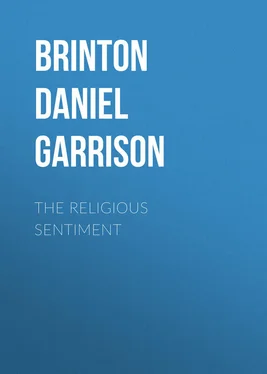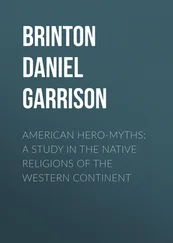Daniel Brinton - The Religious Sentiment
Здесь есть возможность читать онлайн «Daniel Brinton - The Religious Sentiment» — ознакомительный отрывок электронной книги совершенно бесплатно, а после прочтения отрывка купить полную версию. В некоторых случаях можно слушать аудио, скачать через торрент в формате fb2 и присутствует краткое содержание. ISBN: , Жанр: foreign_antique, foreign_prose, на английском языке. Описание произведения, (предисловие) а так же отзывы посетителей доступны на портале библиотеки ЛибКат.
- Название:The Religious Sentiment
- Автор:
- Жанр:
- Год:неизвестен
- ISBN:http://www.gutenberg.org/ebooks/30061
- Рейтинг книги:3 / 5. Голосов: 1
-
Избранное:Добавить в избранное
- Отзывы:
-
Ваша оценка:
- 60
- 1
- 2
- 3
- 4
- 5
The Religious Sentiment: краткое содержание, описание и аннотация
Предлагаем к чтению аннотацию, описание, краткое содержание или предисловие (зависит от того, что написал сам автор книги «The Religious Sentiment»). Если вы не нашли необходимую информацию о книге — напишите в комментариях, мы постараемся отыскать её.
The Religious Sentiment — читать онлайн ознакомительный отрывок
Ниже представлен текст книги, разбитый по страницам. Система сохранения места последней прочитанной страницы, позволяет с удобством читать онлайн бесплатно книгу «The Religious Sentiment», без необходимости каждый раз заново искать на чём Вы остановились. Поставьте закладку, и сможете в любой момент перейти на страницу, на которой закончили чтение.
Интервал:
Закладка:
The startling refuge was had in the image of a deity at once of both sexes. Such avowedly were Mithras, Janus, Melitta, Cybele, Aphrodite, Agdistis; indeed nearly all the Syrian, Egyptian, and Italic gods, as well as Brahma, and, in the esoteric doctrine of the Cabala, even Jehovah, whose female aspect is represented by the “Shekinah.” To this abnormal condition the learned have applied the adjectives epicene, androgynous, hermaphrodite, arrenothele. In art it is represented by a blending of the traits of both sexes. In the cult it was dramatically set forth by the votaries assuming the attire of the other sex, and dallying with both. 42 42 This is probably what was condemned in Deuteronomy xxii. 5, and Romans, i. 26.
The phallic symbol superseded all others; and in Cyprus, Babylonia and Phrygia, once in her life, at least, must every woman submit to the embrace of a stranger.
Such rites were not mere sensualities. The priests of these divinities often voluntarily suffered emasculation. None but a eunuch could become high priest of Cybele. Among the sixteen million worshippers of Siva, whose symbol is the Lingam, impurity is far less prevalent than among the sister sects of Hindoo religions. 43 43 “The worship of Siva is too severe, too stern for the softer emotions of love, and all his temples are quite free from any allusions to it.” – Ferguson, Tree and Serpent Worship , p. 71.
To the Lingayets, the member typifies abstractly the idea of life. Therefore they carve it on sepulchres, or, like the ancient nations of Asia Minor, they lay clay images of it on graves to intimate the hope of existence beyond the tomb.
This notion of a hermaphrodite deity is not “monstrous,” as it has been called. There lies a deep meaning in it. The gods are spirits, beings of another order, which the cultivated esthetic sense protests against classing as of one or the other gender. Never can the ideal of beauty, either physical or moral, be reached until the characteristics of sex are lost in the concept of the purely human. In the noblest men of history there has often been noted something feminine, a gentleness which is not akin to weakness; and the women whose names are ornaments to nations have displayed a calm greatness, not unwomanly but something more than belongs to woman. Art acknowledges this. In the Vatican Apollo we see masculine strength united with maidenly softness; and in the traditional face and figure of Christ a still more striking example how the devout mind conjoins the traits of both sexes to express the highest possibility of the species. “Soaring above the struggle in which the real is involved with its limitations, and free from the characteristics of gender, the ideal of beauty as well as the ideal of humanity, alike maintain a perfect sexual equilibrium.” 44 44 W. von Humboldt, in his admirable essay Ueber die Männliche und Weibliche Form ( Werke, Bd. I. ). Elsewhere he adds: “In der Natur des Gœttlichen strebt alles der Reinheit und Vollkommenheit des Gattungsbegriff entgegen.”
Another and more familiar expression of the religious emotion, akin to the belief in double-sexed deities, – nay, in its physiological aspect identical with it, as assuming sexual self-sufficiency, is the myth of the Virgin-Mother.
When Columbus first planted the cross on the shores of San Domingo, the lay brother Roman Pane, whom he sent forth to convert the natives of that island, found among them a story of a virgin Mamóna, whose son Yocaúna, a hero and a god, was chief among divinities, and had in the old times taught this simple people the arts of peace and guided them through the islands. 45 45 I have collected the Haitian myths, chiefly from the manuscript Historia Apologetica de las Indias Occidentales of Las Casas, in an essay published in 1871, The Arawack Language of Guiana in its Linguistic and Ethnological Relations .
When the missionaries penetrated to the Iroquois, the Aztecs, the Mayas, and many other tribes, this same story was told them with such startling likeness to one they came to tell, that they felt certain either St. Thomas or Satan had got the start of them in America.
But had these pious men known as well as we do the gentile religions of the Old World, they would have seasoned their admiration. Long before Christianity was thought of, the myth of the Virgin-Mother of God was in the faith of millions, as we have had abundantly shown us of late years by certain expounders of Christian dogmas.
How is this strange, impossible belief to be explained? Of what secret, unconscious, psychological working was it the expression? Look at its result. It is that wherever this doctrine is developed the status matrimonialis is held to be less pure, less truly religious, than the status virginitatis . Such is the teaching to-day in Lhassa, in Rome; so it was in Yucatan, where, too, there were nunneries filled with spouses of God. I connect it with the general doctrine that chastity in either sex is more agreeable to God than marriage, and this belief, I think, very commonly arises at a certain stage of development of the religious sentiment, when it unconsciously recognises the indisputable fact that sex-love, whether in its form of love of woman, family, or nation, is not what that sentiment craves. This is first shown by rejecting the idea of sex-love in the birth of the god; then his priests and priestesses refuse its allurements, and deny all its claims, those of kindred, of country, of race, until the act of generation itself is held unholy and the thought of sex a sin. By such forcible though rude displays do they set forth their unconscious acknowledgment of that eternal truth: “He that loveth son or daughter more than Me, is not worthy of Me.”
The significance of these words is not that there is an antagonism in the forms of love. It is not that man should hate himself, as Pascal, following the teachings of the Church, so ably argued; nor that the one sex should be set over against the other in sterile abhorrence; nor yet that love of country and of kindred is incompatible with that toward the Supreme of thought; but it is that each of these lower, shallower, evanescent forms of emotion is and must be lost in, subordinated to, that highest form to which these words have reference. Reconciliation, not abnegation, is what they mean.
Even those religions which teach in its strictness the oneness of God have rarely separated from his personality the attribute of sex. He is the father, pater et genitor , of all beings. The monotheism which we find in Greece and India generally took this form. The ancient Hebrews emphasized the former, not the latter sense of the word, and thus depriving it of its more distinctive characteristics of sex, prepared the way for the teachings of Christianity, in which the Supreme Being always appears with the attributes of the male, but disconnected from the idea of generation.
Singularly enough, the efforts to which this latent incongruity prompts, even in persons speaking English, in which tongue the articles and adjectives have no genders, point back to the errors of an earlier age. A recent prayer by an eminent spiritualist commences: – “Oh Eternal Spirit, our Father and our Mother!” The expression illustrates how naturally arises the belief in a hermaphrodite god, when once sex is associated with deity.
Of all founders of religions, Mohammed first proclaimed a divinity without relation to sex. One of his earliest suras reads:
“He is God alone,
God the eternal.
He begetteth not, and is not begotten;
And there is none like unto him.”
And elsewhere: —
“He hath no spouse, neither hath he any offspring.” 46 46 The Koran , Suras, cxii., lxii., and especially xix.
Интервал:
Закладка:
Похожие книги на «The Religious Sentiment»
Представляем Вашему вниманию похожие книги на «The Religious Sentiment» списком для выбора. Мы отобрали схожую по названию и смыслу литературу в надежде предоставить читателям больше вариантов отыскать новые, интересные, ещё непрочитанные произведения.
Обсуждение, отзывы о книге «The Religious Sentiment» и просто собственные мнения читателей. Оставьте ваши комментарии, напишите, что Вы думаете о произведении, его смысле или главных героях. Укажите что конкретно понравилось, а что нет, и почему Вы так считаете.












